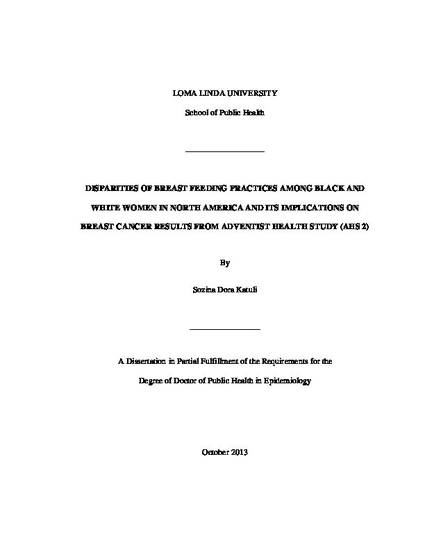
Dissertation
Disparities of Breast Feeding Practices among Black and White Women in North America and its Implications on Breast Cancer Results from Adventist Health Study (AHS 2)
(2013)
Abstract
Breast cancer is the second most common cancer and second leading cause of death in American women. Disparities in breast cancer and breast feeding have been reported, however the studies on relationship between breastfeeding and breast cancer have shown inconsistent results. In this study we aim to determine factors associated with disparity of breastfeeding patterns among Adventist women in North America and the relationship between duration of breastfeeding and the development of post-menopausal cancer.
We evaluated the breastfeeding patterns of 26,926 white and 10,550black parous females, aged 30-80 years, who were enrolled in the Adventist Health Study-2 (AHS-2) a cohort of 96,000 subjects across the US and Canada. We used Log linear binomial and multiple linear regression models, to evaluate initiation of breastfeeding and length (months/child) of breastfeeding respectively. While Cox proportional hazard was used to evaluate the association the duration of breastfeeding and breast cancer. Analyses were adjusted for age, education, parity, body mass index, marital status, country lived at age 16-25, oral contraceptive use and dietary patterns. In addition to these covariates we also adjusted for age at menarche, family history of BC in the breast cancer analysis.
Black women were less likely to breastfeed than white women (prevalence ratio=0.87, 95 percent Confidence Interval: 0.85 - 0.88). Black women breastfed on average 1.2 months shorter per child than white women. Education, living outside the US at age 16-25, marital status, oral contraceptive use, body mass index, age and parity were all significant predictors of length of breastfeeding. Women’s dietary patterns also influenced their decision to breast feed with vegetarians tending to breastfeed more than non-vegetarians.
We found that known disparities of breast feeding among black and white women in North America exist also among Adventist women, but to a lesser degree. Every breast feeding is associated with some reduction in risk of breast cancer (HR1.29, 95% CL 0.94- 1.77) however the findings did not reach statistical significance due to insufficient power. More studies to evaluate exclusive breastfeeding, psychological and social barriers among Blacks are needed to further the underlying causes of this disparity.
Keywords
- breast cancer,
- breastfeeding
Disciplines
Publication Date
2013
Degree
Doctor of Public Health
Field of study
Epidemiology
Department
Loma Linda University
Advisors
Synnove Knutsen, Oda Keiji, Raymond Knutsen, Ron Mataya
Citation Information
Sozina Katuli. "Disparities of Breast Feeding Practices among Black and White Women in North America and its Implications on Breast Cancer Results from Adventist Health Study (AHS 2)" (2013) Available at: http://works.bepress.com/sozina-katuli/4/
